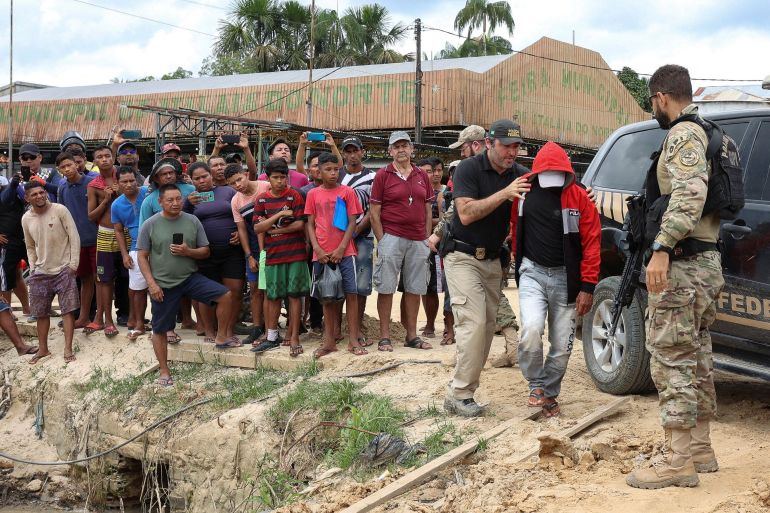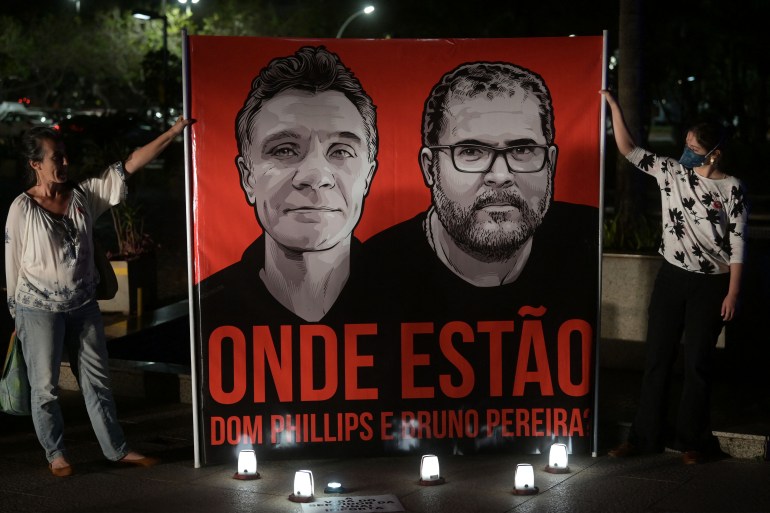Brazil police find remains, suspects confess in search for men
Disappearance of journalist Dom Phillips and guide Bruno Pereira in Brazil’s Amazon rainforest had raised global alarm.

Brazilian police have found human remains in their search for missing British journalist Dom Phillips and Brazilian indigenous expert Bruno Pereira after a suspect confessed to killing them in the Amazon rainforest and took investigators to where the bodies were buried.
The suspect, a fisherman who had reportedly clashed with Pereira over his efforts to combat illegal fishing in Indigenous territory, led police to a remote burial site where the remains were unearthed, detective Eduardo Fontes told a news conference.
Keep reading
list of 3 itemsDeath toll from torrential rains in northeast Brazil reaches 100
Belongings of missing Indigenous expert, reporter found in Amazon
“We found the bodies three kilometers (nearly two miles) into the woods,” Fontes said.
Brazil’s justice minister said earlier on Wednesday that police had reported finding human remains in the area where the two men had disappeared, and that they would be “submitted to forensics”.
The announcement marks a grim conclusion to a case that had raised global alarm, hanging over Brazilian President Jair Bolsonaro at a regional summit last week and stirring concern in the British parliament on Wednesday.
Bolsonaro said on Wednesday afternoon he expected the case to be resolved “in coming hours.”
Phillips, a freelance reporter who had written for Britain’s Guardian newspaper as well as the US-based Washington Post, was doing research for a book on the trip with Pereira, a former head of isolated and recently contacted tribes at Brazil’s federal Indigenous affairs agency Funai.
They were in a remote jungle area near the border with Colombia and Peru called the Javari Valley, which is home to the world’s largest number of uncontacted Indigenous people. The region has been invaded by illegal fishermen, hunters, loggers and miners, and police say it is a key route for drug trafficking.
Police had previously identified two suspects in the investigation: fisherman Amarildo da Costa de Oliveira, known as “Pelado”, and his brother Oseney da Costa de Oliveira, 41, or “Dos Santos”.
The brothers were seen meeting on the Itacoai river just moments after Phillips and Pereira passed by on June 5, a witness told police in a report seen by the Reuters news agency.
Amarildo was arrested last week on weapons charges and is being held while police investigate his involvement in the case. Oseney was taken into custody on Tuesday night.
The suspects’ family have denied they had any role in the men’s disappearance. Public defenders representing the brothers could not immediately be reached by Reuters for comment.

Rights groups and press freedom advocates have been calling on Brazilian authorities to step up their search for Phillips and Pereira.
Carlos Martinez de la Serna, programme director at the watchdog Committee to Protect Journalists, last week urged Brazil to “redouble” efforts to find the two men.
“There is a clear pattern of threats and attacks on journalists and activists in Brazil who document environmental issues and violations of Indigenous peoples’ rights, and authorities have yet to put in place effective mechanisms for their protection,” he said in a statement.
In an editorial published on June 8, the Guardian also said “the response from the Brazilian authorities has been at best sluggish and underwhelming”.